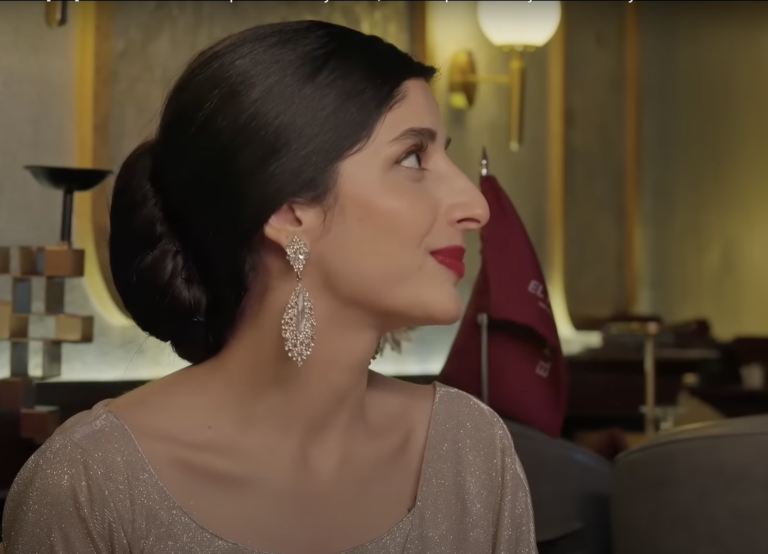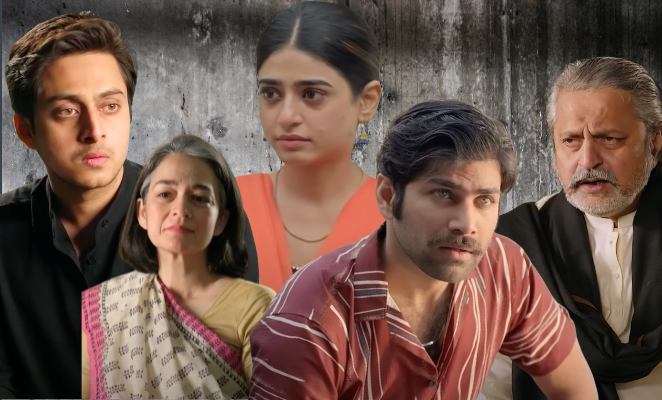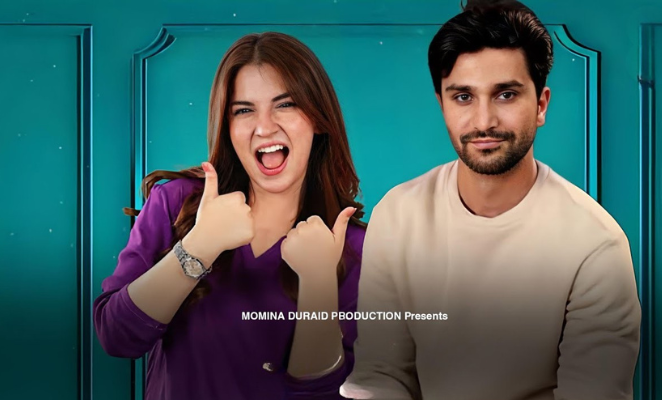Lagta hai Annie mein to Bi-Amma ki rooh hadool kar gaye hai tabhi usnay yeh hoolia bana rakha hai.
Ladki ho to aisi jikay saath chaltay hua insaan fakar mehsoos karay na ki sharmindagi.
How many amongst us judge those different from us? How many of us deviate to the norm only because the norm guarantees us safety and security? How many of us quickly judge the Hijabans as paindo-jahil-junglee khawateen or better yet as pakhandi-dhongi-attention seeking? Saach, saach batana how many? Kitnay…?
Shanakht. Pehchan. Self. Identity.
These are perhaps the eternal questions that haunts us. Hum kaun hain? Hum kyun hai? Humari pehchan kya hai – humara din-iman, humari wataniyat, humara qabeela, humari zabaan, kya?
Let me preface this review by saying that I’m not one to taken by preachy and holier-than-thou renditions of finding oneself. In recent years, we’ve seen Falak in search of her zaat in Shehr-e-Zaat and Daaniyal in exile in Laa, all in the hopes of finding that ever elusive thing called Shanakht.
And this where our story begins with Quratalain’s (Maya Ali) spiritual quest. Born into a world of privilege, Annie has shocked her cultured, khandani, rayees, and modern family beyond belief by adopting the hijab, and that too the Arab version of it. Her mother, Huma (Sabahat Bukhari), sees this as sign of rebellion, but I wonder what Annie is rebelling against? She comes from a liberal and loving home without any outward signs of distress like financial insecurity, domestic abuse, or even inattentive parents! So why the sudden need for taking the hijab?
With this unexpected change engulfing Annie in a storm of questions – hijab, na-mahram, a sudden quietness in character, an introversion – her relationships are slowly being tested. Her Taya and Tayee, Ahmed and Shireen (Shamim Hilali), her cousin, Hashim (Noor Hassan), her sister, Kashaf (Sadia Faisal) and her Ammi and Abbu – all have concerns, and some valid ones too! As much as Annie is confused by the reaction of those closest to her, her family is equally if not more so confused by how to react. Hashim ignores the change as much as he can, Shireen is cautious, Huma is (and perhaps rightly so) angry (and I’ll get to this point momentarily), and Sadia is supercilious. The only person who extends his full support to Annie is her Abbu-jaan, Amjad (Mohsin Gillani).
Now correct me if I’m wrong but taking the hijab is a very difficult decision not because it differentiates you from the crowd (because that point is debatable, if you’re in Purani Dilli then you’re really not that different, if you’re in Khan Market, then, you’re considered (in a very derogatory manner) a “Ninja“) rather because it requires a considerable change in your lifestyle, in your interactions, and in how you’re perceived. Knowing full well that this would place her at the periphery of her parents’ social circle, Annie still goes ahead with it, which makes me wonder out loud: why? Was there something lacking in her upbringing? Are liberal people incapable of inculcating spiritual and religious values? Are we spiritually bankrupt in our quest for everything “modern” and “Western”? What does it signify – for Annie, for her sense of self, and for her identity?
At the same time I cannot turn a blind eye to Huma’s perspective. As a mother, I can see why she is hesitant at this change, perhaps, it was her upbringing, maybe she wasn’t able to provide something, at some spiritual level, for her daughter. These feelings of failure, for lack of a better word, are exhibited in anger and in blame (if you noticed Aisha is quick to take the fall!).
What I found engaging in this very slow episode was the overt emphasis on character development. There wasn’t a single character with the exception of Sadia whose motives I couldn’t fathom. I was conveniently given a momentary insight into the working of Annie’s mind and Hashim’s affections, of Huma’s doubts and Amjad’s faith, and of Shireen’s caution and Sadia’s despise.
Interestingly, just as Mrs. Khan in Pehchan functions as a sit-in for our mashara, Jabbar and his chichora comments bring us back to what the world thinks. This is also reflected in Huma (especially the very awkward conversation with her friend) and to some extent in Shireen. And something tells me these perceptions are a crucial part of the narrative.
A well-paced first episode with good camerawork and art direction, I am curious to see what happens next. Am I on-board the bandwagon? No, not yet, Shanakht still needs to convince me that they’re not preaching to the choir or otherwise.
Till next week.
Rab Rakha
RB (Tweet me!)
P.S. Mein ab sab say guzarish karoon ga ki apni duaoon mein Phalasteen ki awaam ko yaad rakhain. Un ko iss azaab say Khuda’Talah jaldi bakshay. Ameen.









 Saim
Saim 

 Naqsh begins today, taking over the Faraar tim
Naqsh begins today, taking over the Faraar tim



